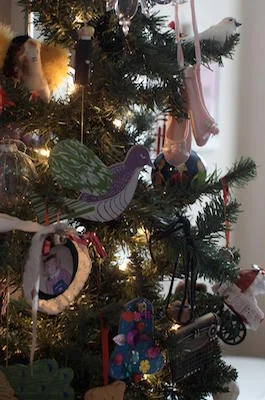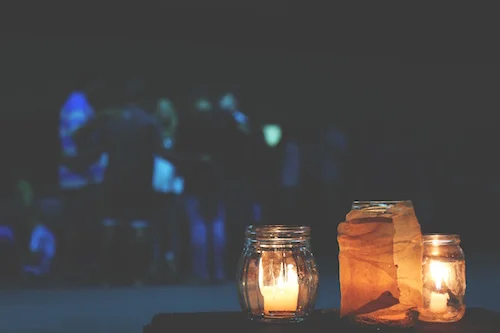I know this puzzle has holes in it, yet I never throw it out. I like its scene, the kind of place you might escape to in a novel. I enjoy the safe and secure process. But I also value the reminder that our planet is marred, that this desire for a stress-free ordering of a perfect and predictable picture has its place as an amusement or diversion but is not part and parcel of this world, already redeemed but paradoxically not yet.
All in Hospitality
A Romantic Celebrates Christmas
Driving home in the rain a couple of weeks ago, the red lights from the new Mexican restaurant mixed with the green traffic lights, creating a slick of holiday color. Instead of a wet mess, it felt like a gift, a cacophony of color for my damp drive home. I wondered if I would have seen it if I hadn’t been paying attention, keeping my eyes peeled for moments of wonder.
Key of David
Advent is not only about what has happened; it is about what we still need to happen. It is about waiting, about that quiet, anticipatory, mildly uncomfortable moment before the song starts up, the lights come on, the guests arrive. Advent takes place in the dark.
Stalled by Grace
My dear Britney, I felt, take note of this: You should be quick to listen, slow to speak and slow to become angry. Not simply because it will end in less frustration and hurt feelings, but because it is how we are surprised by life, and grace, and God.
Small Things, Slow Work
To love our city and care about the arts and creativity has been about loving and caring for individual people. And I think for any of us it comes down to that. Loving a city and its people in general doesn’t mean a whole lot. Loving a city and its people in specific, however our callings lead us, means everything.
A Sojourn in Sweden
Twenty years ago this past summer I traveled to the land of my ancestors. A land I had heard about my whole life, a storybook country of lakes and forests and flaxen-haired princesses. Of blue and yellow flags and three golden crowns atop many a spire. It was “the old country” of my grandparents on both maternal and paternal sides. Surnames like Lundberg, Holmberg, Appelquist, Boquist, and Engwall wrapped my childhood in their soft sing-song melodies. And I was one small variation on that theme, about to join the main chorus.
You Are Here to Kneel
I decided that I was the wrong kind of person to visit a monastic order. I was too uncivilized and unlearned, too ornery and idealistic, and maybe even too Protestant. But during our final breakfast with Father Donovan, I scooped jewel-red currant jam I’d helped prepare onto homemade Irish bread and listened to the monk discuss theology, politics, and the proper method of a coffee press. I began to wonder if maybe I'm exactly the right sort after all.
Tell Me a Story
We can never overestimate the value of listening to someone’s story, for it takes great courage to share a hurt or even a joy with another person. The fear of rejection, misunderstanding, or criticism often keeps us from telling someone what has made us who we are. But when another person takes the time to sit with us and listen to what we have lived, our hearts grow stronger.
On Honest Art
For a day we considered our deepest disposition, sons of Adam and daughters of Eve that we are: we compartmentalize, we believe one thing to be true and behave as if another thing is true, we say “This matters most!” and then live as if it doesn’t really. This tendency has profound implications, for learning, for labor, for love, for liturgy—for all of who we are, for all of how we live.
How do we begin to find our way to coherence? Can we even imagine a way of seeing and hearing that honestly connects what we believe with the way that we live?
 I will grow in the waiting and be stretched in the loving, and I will be there to smile and wave every time she emerges from this process of becoming. I will choose to bend towards trusting a God who is big enough to hold us both. Heart of my heart, flesh of my flesh, Grace will explore this world in her own way, just like I continue to do.
I will grow in the waiting and be stretched in the loving, and I will be there to smile and wave every time she emerges from this process of becoming. I will choose to bend towards trusting a God who is big enough to hold us both. Heart of my heart, flesh of my flesh, Grace will explore this world in her own way, just like I continue to do.
 Sometimes I wonder if the distractions protect us.
Sometimes I wonder if the distractions protect us.
We try to prepare ourselves for life’s inevitable. Recently, an unusual number of patients died. Others are at end stages of life. Coping with the losses holds a unique challenge as we find little opportunity to grieve. Instead, we push through to care for the living patients before us.
Spaces for Hope in the Margins
I cannot make my neighbors less fearful, uncertain, or afraid. I cannot change the world or stop the violence. I can, however, in my little place on the margin of life, faithfully seek to live, think, and speak hopefully. Perhaps it will be a spark that will spread more widely and do some good—after all, hope is life-giving, generative. Perhaps not, but that is not my concern. My concern is to make culture faithfully, culture that will encourage people to flourish in this broken world. And being hopeful is culture making because creativity and art and flourishing is impossible without hope.
 I don't notice the robin making her nest. Neither do I notice when she lays her eggs. I don't know how long she bides her time there, waiting for their hatching. After two weeks of rain, the kids and I come outside, squint in the sun, and find four tiny beaks stretching up from a nest on our meter box. The mama robin swoops in, drops in her food, and then flies to a nearby branch to keep watch. We are mesmerized.
I don't notice the robin making her nest. Neither do I notice when she lays her eggs. I don't know how long she bides her time there, waiting for their hatching. After two weeks of rain, the kids and I come outside, squint in the sun, and find four tiny beaks stretching up from a nest on our meter box. The mama robin swoops in, drops in her food, and then flies to a nearby branch to keep watch. We are mesmerized.
 No matter where his pastoral vocation called him—country, city, suburb—Dad found a large vacant lot of lawn or weeds to plow under and plant in long straight rows, ordered in relation to the sun (the corn stalks must not overshadow the tomatoes) and surrounded by winter-squash vines prone to wander outside the frame.
No matter where his pastoral vocation called him—country, city, suburb—Dad found a large vacant lot of lawn or weeds to plow under and plant in long straight rows, ordered in relation to the sun (the corn stalks must not overshadow the tomatoes) and surrounded by winter-squash vines prone to wander outside the frame.
It was not Eden, except in his view.
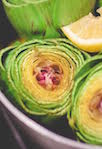 When I tell people that I am a food writer, they always ask me what I like to cook. I want to ask them if they would ask a film critic to tell them about the movie they are shooting at the moment, but instead I just smile and say, “Scrambled eggs.” That is only part of the truth, but I don’t usually tell them that I started writing about food before I started cooking, creating standards that I could never meet. I do not tell them that fear of failure often means that I eat pre-made guacamole or cheese and crackers for dinner. I worry that this will take away my credibility, even though I know that not everyone who writes about food claims to be good at preparing it.
When I tell people that I am a food writer, they always ask me what I like to cook. I want to ask them if they would ask a film critic to tell them about the movie they are shooting at the moment, but instead I just smile and say, “Scrambled eggs.” That is only part of the truth, but I don’t usually tell them that I started writing about food before I started cooking, creating standards that I could never meet. I do not tell them that fear of failure often means that I eat pre-made guacamole or cheese and crackers for dinner. I worry that this will take away my credibility, even though I know that not everyone who writes about food claims to be good at preparing it.
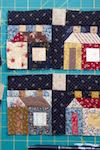 When I stitch my little felt ornaments, my fingers sometimes get sore. I take breaks and rub them, looking out the window and listening to the sermon that is streaming. “It is perhaps through the work of kind welcome and laden table and warm bed,” the pastor says, “that the church labors most effectively to bear witness to the reality of the kingdom of God and the welcome that we receive in God in Christ.” He is preaching on the book of Ruth. Ruth! I studied it so many times in college, together with girlfriends all waiting for men, for boyfriends, for husbands, trying to glean some insight from this woman who did strange things indeed to secure her man. That is not the point of the book, the preacher says. I breathe a sigh of relief. Instead, he gleans kindness, hope, hospitality from the passages. The kind of hospitality that hems in, honors, and protects everything about the person being welcomed into our lives.
When I stitch my little felt ornaments, my fingers sometimes get sore. I take breaks and rub them, looking out the window and listening to the sermon that is streaming. “It is perhaps through the work of kind welcome and laden table and warm bed,” the pastor says, “that the church labors most effectively to bear witness to the reality of the kingdom of God and the welcome that we receive in God in Christ.” He is preaching on the book of Ruth. Ruth! I studied it so many times in college, together with girlfriends all waiting for men, for boyfriends, for husbands, trying to glean some insight from this woman who did strange things indeed to secure her man. That is not the point of the book, the preacher says. I breathe a sigh of relief. Instead, he gleans kindness, hope, hospitality from the passages. The kind of hospitality that hems in, honors, and protects everything about the person being welcomed into our lives.
Back to the Garden
Perhaps like these women and the little girl, and maybe like others who feed people as part of a parenting vocation or faith community, I see the garden through the lens of my own faith and call to mothering and being mothered, the garden as a connection to nourishment and solace.
And to redemption. A safe haven where I might receive life and pass it on, or get it back from the edge of death.
 Hospitality is serving people and helping people who are in our home. We listen. If they stay in our home, I fix meals and prepare a bed and so forth for them. I read something about—I think it is Benedict's Rule of Hospitality—that there's a difference between serving and being a servant. When I'm serving, I'm in charge. If I'm a servant, you're part of it. If you want to do something to help me, I'll let you do it because that's allowing you in. You're not being in charge. I'm not being in charge.
Hospitality is serving people and helping people who are in our home. We listen. If they stay in our home, I fix meals and prepare a bed and so forth for them. I read something about—I think it is Benedict's Rule of Hospitality—that there's a difference between serving and being a servant. When I'm serving, I'm in charge. If I'm a servant, you're part of it. If you want to do something to help me, I'll let you do it because that's allowing you in. You're not being in charge. I'm not being in charge.
 To be human is to be hungry, to crave milk and honey, to be brought to a banqueting table bannered with love. I’m pulling my chair up to that table, that midnight feast, that last supper, that hospital dumpling delivery, that promise of milk and honey and the ability to enjoy it.
To be human is to be hungry, to crave milk and honey, to be brought to a banqueting table bannered with love. I’m pulling my chair up to that table, that midnight feast, that last supper, that hospital dumpling delivery, that promise of milk and honey and the ability to enjoy it.
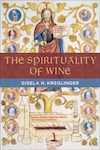 Could it be that God wanted to redeem not only my life but also all the hustle and bustle that life on the winery brings? We work so hard to make a living from growing vines and crafting wine. Could it be that God cared about it and perhaps was even involved in it? This idea is not quite what I had learned in my confirmation classes over the last two years. But was it not true? Had Jesus not made wine as well?
Could it be that God wanted to redeem not only my life but also all the hustle and bustle that life on the winery brings? We work so hard to make a living from growing vines and crafting wine. Could it be that God cared about it and perhaps was even involved in it? This idea is not quite what I had learned in my confirmation classes over the last two years. But was it not true? Had Jesus not made wine as well?
















